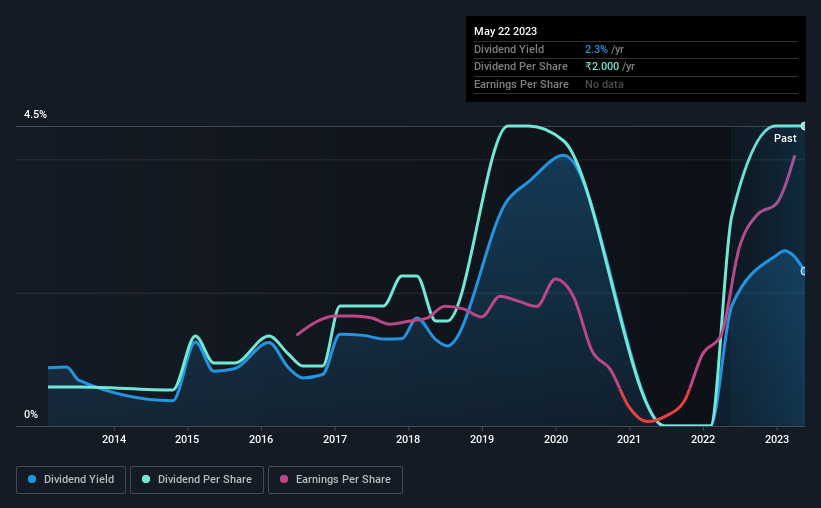- India
- /
- Hospitality
- /
- NSEI:ADVANIHOTR
Advani Hotels & Resorts (India) (NSE:ADVANIHOTR) Has Affirmed Its Dividend Of ₹1.40

The board of Advani Hotels & Resorts (India) Limited (NSE:ADVANIHOTR) has announced that it will pay a dividend on the 18th of June, with investors receiving ₹1.40 per share. The dividend yield will be 2.3% based on this payment which is still above the industry average.
Check out our latest analysis for Advani Hotels & Resorts (India)
Advani Hotels & Resorts (India)'s Payment Has Solid Earnings Coverage
A big dividend yield for a few years doesn't mean much if it can't be sustained. Prior to this announcement, Advani Hotels & Resorts (India)'s dividend was comfortably covered by both cash flow and earnings. This indicates that a lot of the earnings are being reinvested into the business, with the aim of fueling growth.
If the trend of the last few years continues, EPS will grow by 27.1% over the next 12 months. If the dividend continues on this path, the payout ratio could be 54% by next year, which we think can be pretty sustainable going forward.

Dividend Volatility
Although the company has a long dividend history, it has been cut at least once in the last 10 years. The dividend has gone from an annual total of ₹0.26 in 2013 to the most recent total annual payment of ₹2.00. This works out to be a compound annual growth rate (CAGR) of approximately 23% a year over that time. It is great to see strong growth in the dividend payments, but cuts are concerning as it may indicate the payout policy is too ambitious.
The Dividend Looks Likely To Grow
Given that the dividend has been cut in the past, we need to check if earnings are growing and if that might lead to stronger dividends in the future. Advani Hotels & Resorts (India) has impressed us by growing EPS at 27% per year over the past five years. The company's earnings per share has grown rapidly in recent years, and it has a good balance between reinvesting and paying dividends to shareholders, so we think that Advani Hotels & Resorts (India) could prove to be a strong dividend payer.
Advani Hotels & Resorts (India) Looks Like A Great Dividend Stock
Overall, we like to see the dividend staying consistent, and we think Advani Hotels & Resorts (India) might even raise payments in the future. Distributions are quite easily covered by earnings, which are also being converted to cash flows. Taking this all into consideration, this looks like it could be a good dividend opportunity.
Companies possessing a stable dividend policy will likely enjoy greater investor interest than those suffering from a more inconsistent approach. However, there are other things to consider for investors when analysing stock performance. Case in point: We've spotted 3 warning signs for Advani Hotels & Resorts (India) (of which 1 shouldn't be ignored!) you should know about. If you are a dividend investor, you might also want to look at our curated list of high yield dividend stocks.
New: Manage All Your Stock Portfolios in One Place
We've created the ultimate portfolio companion for stock investors, and it's free.
• Connect an unlimited number of Portfolios and see your total in one currency
• Be alerted to new Warning Signs or Risks via email or mobile
• Track the Fair Value of your stocks
Have feedback on this article? Concerned about the content? Get in touch with us directly. Alternatively, email editorial-team (at) simplywallst.com.
This article by Simply Wall St is general in nature. We provide commentary based on historical data and analyst forecasts only using an unbiased methodology and our articles are not intended to be financial advice. It does not constitute a recommendation to buy or sell any stock, and does not take account of your objectives, or your financial situation. We aim to bring you long-term focused analysis driven by fundamental data. Note that our analysis may not factor in the latest price-sensitive company announcements or qualitative material. Simply Wall St has no position in any stocks mentioned.
About NSEI:ADVANIHOTR
Flawless balance sheet established dividend payer.
Market Insights
Community Narratives



